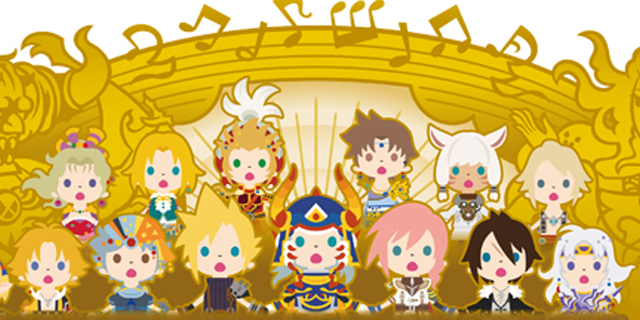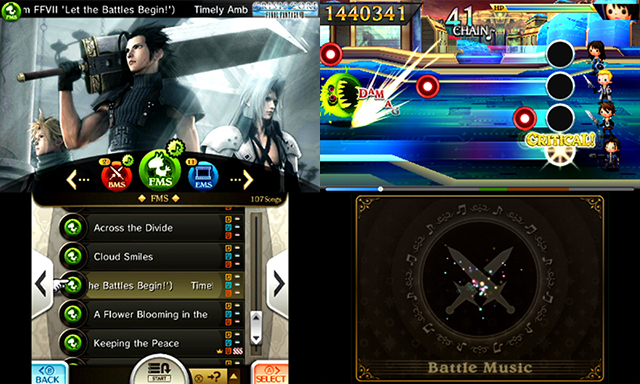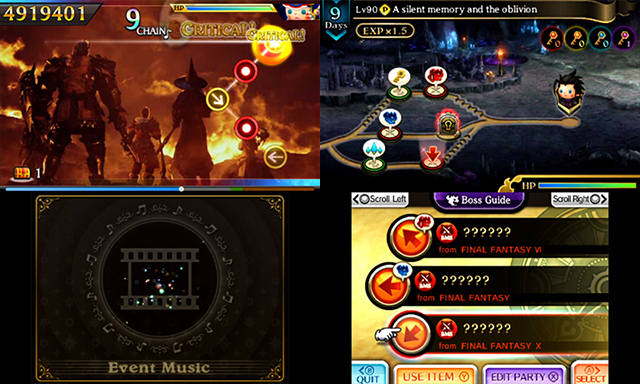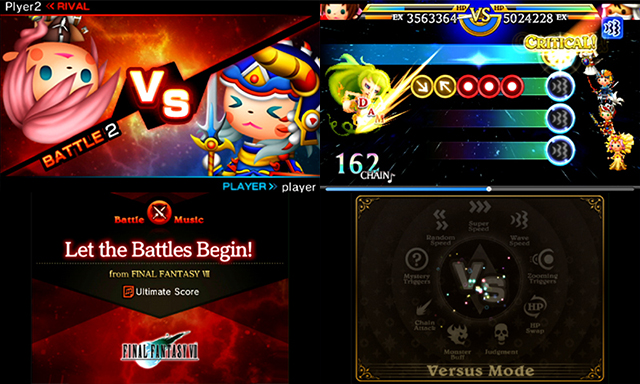
The original Theatrhythm Final Fantasy, despite its ridiculous title, was one of the best early offerings on the 3DS. It made several of our year-end top ten lists, was a runner-up to our Best 3DS Game award that year and was a virtual lock to make our 3DS Best to Own Forever list earlier this year. And it would have, were it not for the fact that a sequel, Curtain Call, was about to be released.
Curtain Call takes everything that made Theatrhythm great and adds more of it: more songs, more characters, more titles from which to draw those songs and more of the original’s “Dark Notes,” now turned into the new Quest Medley mode. It even removed some of the minor flaws, like the pointless (if optional) tap-fest Intros and Epilogues and restricting the characters’ skill slots to a specific type.
Also gone is Series Mode, which is understandable, since there are frequently more than three songs per original game now and it would get a bit unwieldy. In fact, there are over 200 songs drawn from 25 individual titles, including spinoff titles Crystal Chronicles, Tactics, both Dissidia games, Type-0, Mystic Quest and Crisis Core, plus one bonus song from the “Final Fantasy Series.” There are even songs from Advent Children, which isn’t even an actual game. Sadly, no handheld titles like Tactics Advance or 4 Heroes of Light made the roster, but this is still about twice as many titles as the previous game’s library.

Mechanically, there isn’t much new here. Music stages still come in three types: Battle, Field and Event. There are only 11 EMS tracks, all of which must be unlocked via rhythmia accumulation. The good news there is that clearing an EMS unlocks its corresponding movie in the Museum immediately, but it’s still somewhat disappointing and my one complaint with Curtain Call overall.
The same three types of note (strike, slash and hold) are back as well, with a new “critical” note feature that rewards you if you perfectly nail the timing on highlighted notes. This reward varies depending on the type of song, but you definitely want to hit them if you can. Curtain Call introduces new control options, including several that don’t even use the stylus. These require using the Circle Pad to hit slash notes and to trace paths on FMS hold notes. The former isn’t terribly difficult, but I found the latter to be awkward and recommend against it. As an added feature, the game records which style you used to clear a song if it was your best performance, so you can see which style works best for you.
As in Theatrhythm, you can collect items for your party via defeating monsters in BMS and covering a lot of ground in FMS, joined now by critical notes in EMS as well. Some of them can aid your party, and others are the returning Collectacards. Curtain Call gives these an actual function, as you can use the “Crystarium” to use cards you’ve collected to boost the stats of a character in your party. The system is a little unwieldy, but it’s better than the cards just being pointless trophies.

The way your party is handled has also changed. Instead of having a large roster of characters at all times, now you just choose an initial party of four. Any characters you unlock are added to your party, but that’s the only way you can change who you’re using. You can change your party more or less at-will, which is especially handy during the lengthy Quest Medleys. Now you can have one group that specializes in FMS and another for BMS (and another for EMS, I guess), although there is no experience bleed so you will have to manage level balance on your own.
A good way to earn XP is via the Quest Medleys that I’ve mentioned a couple of times now. These are multi-song quests that are FMS and BMS laid out on a map with branching paths, some of which might be blocked by locked doors that you can unlock with keys you find along the way. These keys carry over from map to map, so don’t worry about them too much. You only have one health bar for the entire Medley and your healing skills will be reduced in potency, so keep that in mind.
The longer you take to complete a run through a map, the more XP you will earn, both because you are completing more songs and because each “day” adds to a multiplier that applies to whatever you complete. The catch here is that you have to defeat the boss in the final BMS to actually “clear” the quest and earn its one-time rewards, although merely finishing is still enough to earn a new map just like Theatrhythm’s Chaos Shrine. Maps that you have cleared can be attached to your Profile Card and shared via StreetPass as usual.

Other than Quest Medley, the other new way to play is Vs. Mode. This is a variation on BMS that pits your performance against an opponent, either locally, online or against an AI opponent. Of course, it isn’t quite as simple as that. The better you hit notes, the quicker your EX meter fills up. When it does, you automatically launch one of nine random attacks that will mess up your opponent’s timing in one way or another (or sometimes attack their health directly). They get to fire attacks at you as well, naturally. It’s fun for a while, but not really my style of play due to the randomness.
Fortunately, with over 200 songs in three different difficulty levels each, there is more than enough content here to keep me occupied for a very long time without even considering Vs. Mode. And that’s before you even consider DLC, still priced at a dollar per song or character. You are still restricted to downloading new items one at a time, which is a nuisance, but there are already several songs (and as of this writing, one character) available with undoubtedly more to come.
If you thought Theatrhythm was amazing, you will be blown away by Curtain Call. If you somehow missed out so far, you can safely skip directly to Curtain Call, since it contains just about all of the same content plus more. In fact, the only problem with Curtain Call is how it has made Theatrhythm all but obsolete, which is a shame. Square Enix and Indieszero have somehow improved on their original near-perfect offering in just about every way.
Pros: insane number of songs and characters, Quest Medley mode
Cons: slash notes still troublesome in fast-paced songs — especially when they rotate



















